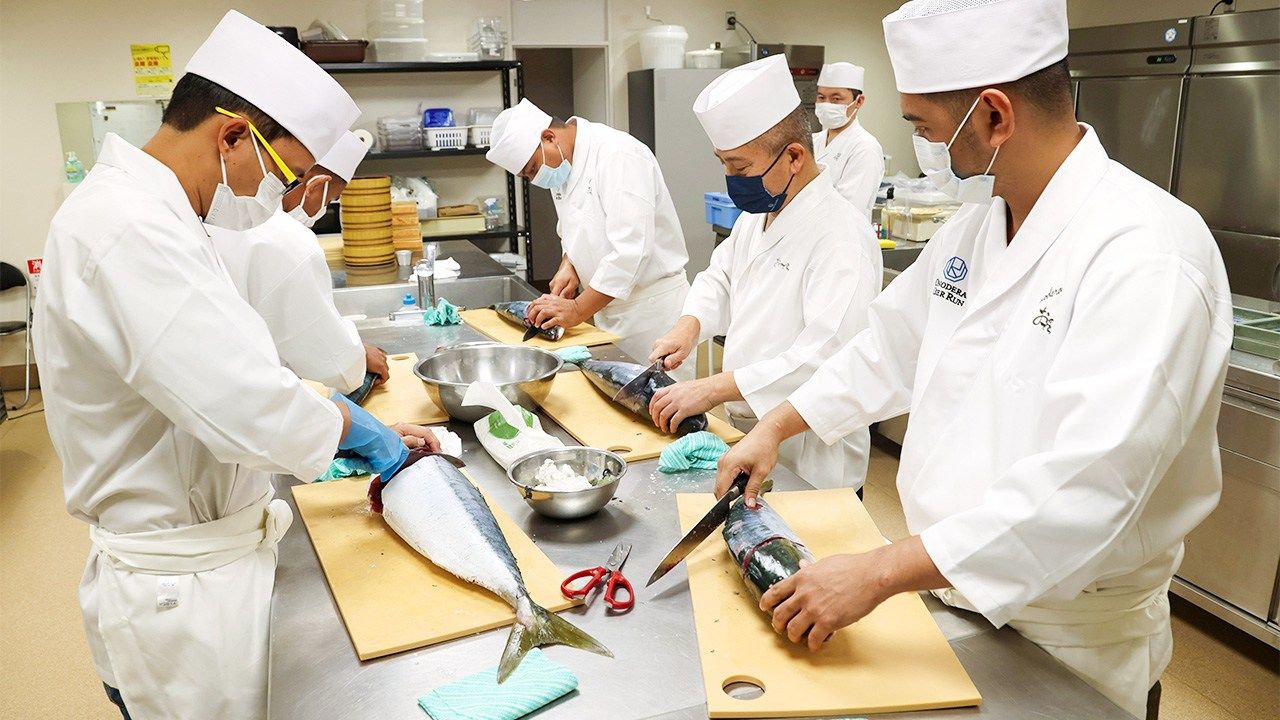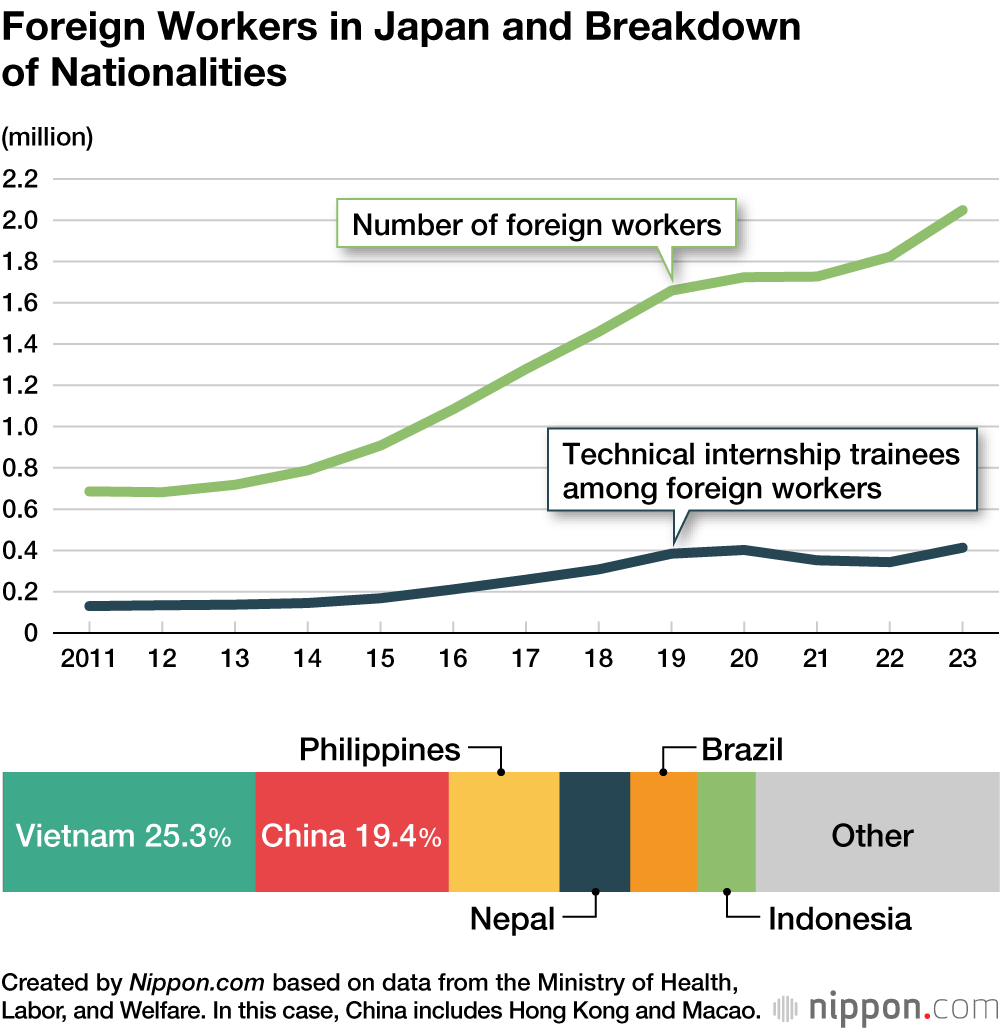
Charting a New Course for Migrant Labor in Japan: Reconciling Labor Needs, Human Rights, and Skills Development
Society Economy WorkIn November 2023, the government panel of which I am a member submitted its final recommendations for reform of the Technical Intern Training Program, first launched in 1993. In the following, I explain our key recommendations in the context of the international labor migration system. Since some knowledge of the system’s mechanisms is essential to understanding the TITP’s issues and our proposed solutions, let us begin there.
Vital Role of Intermediaries
Owing to physical distance and other factors, foreign job seekers and their potential employers generally know very little about one another. Moreover, the government’s rules, procedures, and labor laws create bureaucratic hurdles that both sides must overcome in order to connect. To link and support employers and foreign workers in this challenging environment, there is a need for so-called migration intermediaries. In the TITP, the major intermediaries are (1) the overseas brokers known as sending organizations and (2) so-called supervising organizations, not-for-profit Japanese entities that accept trainees on behalf of affiliated enterprises.
A major source of controversy surrounding the TITP has been the financial burden some sending organizations impose on trainees in the form of high recruitment fees. Because these intermediaries offer their services through the market, their fees are subject to the laws of supply and demand, and since they have a high degree of discretion in setting their rates, it is often difficult to draw the line between legal and illegal practices. In short, the problem of excessive fees is not unique to the TITP but is rooted in the basic mechanism of international labor migration.
There have been repeated attempts to eliminate these intermediaries and link foreign workers directly to prospective employers, but none have had much success. For example, under the Specified Skills visa program that Japan instituted in 2019, Japan and Indonesia agreed to use an online recruitment system (IPKOL), managed by the Indonesian government, to match job seekers with Japanese employers. But according to the Indonesian Embassy in Tokyo, as of late October 2023 not a single Indonesian worker had been placed through the system. This underscores the difficulty of eliminating the role of commercial brokers in the international labor market.
Skills Development as a Key to Worker Rights
Most of the rights violations associated with foreign labor occur in the unskilled labor sector. For this reason, experts believe that skills development is one key to protecting the rights of foreign workers, along with enforcement of labor laws and international treaties. Because international labor migration is driven by economics, simply tightening regulations and guidelines may be insufficient, as stakeholders will continue finding ways around them.
The high recruitment fees imposed on many trainees under the TITP can be attributed in large measure to conditions in the unskilled labor market. Because some Japanese employers participating in the program regard trainee candidates as virtually interchangeable, sending organizations often feel compelled to woo these clients with lavish entertainment or promises of kickbacks in order to boost their recruitment rate, thus inflating brokerage costs. The assumption that unskilled TITP trainees are easily replaceable is also considered a factor contributing to some of the serious rights violations (including beatings and nonpayment of wages) of which certain Japanese employers have been guilty.
When recruiting for more highly skilled jobs, employers are likely to choose purely on the basis of ability, uninfluenced by kickbacks and other sweeteners that have no bearing on job performance. Recruitment fees are therefore likely to fall. To secure skilled personnel, employers may even start covering moving costs, which would further lighten the burden on trainees. Generally speaking, more highly skilled personnel can expect to be treated with greater respect.
Directions for Reform
The following four aims shaped the expert panel’s deliberations and reform recommendations:
- Create a system for the purpose of securing and developing human resources while opening the way for career building by foreign nationals.
- Clearly acknowledge the vital role of the supervising and sending organizations as migration intermediaries.
- Align the system with international trends in the treatment of foreign workers, as by documentation of the skills acquired in Japan.
- Provide multi-layered protection for worker rights.
The first aim is meaningful in that it openly acknowledges that the primary purpose of the system is securing human resources, thus clearly conveying Japan’s intent of becoming a full-fledged participant in the international labor market. Also important, however, is a renewed commitment to developing skills. In the field of international labor migration, much attention is currently focused on skill formation in the receiving country to promote the transfer of skills to the sending country.
For example, the Global Compact for Safe, Orderly, and Regular Migration, adopted by the United Nations in 2018, includes a commitment to “invest in skills development and facilitate mutual recognition of skills, qualifications, and competences.” The Organization for Economic Cooperation and Development, the World Bank, and others have also stressed the importance of enhancing the skills-development and skills-transfer functions of labor migration programs through mutual arrangements referred to as “skills mobility partnerships” and “global skills partnerships.”
Declining birth rates and demographic aging in the industrially developed world have created a need for foreign labor at a number of skill levels. In the “middle skills” category, most countries already have programs for admission of qualified, experienced workers who can hit the ground running, but such programs will not be adequate to meet future demand. One promising option is to admit entry-level workers who can learn on the job. The decision to clearly identify skills development as one function of Japan’s labor migration program is particularly apt in this context.
Oversight and Skills Recognition
Acknowledging the indispensable role of migration intermediaries in international labor migration (the second aim), the panel agreed that stronger oversight of those entities was needed. The final report mentions the need for tighter requirements for supervising organizations, but it provides little in the way of concrete recommendations for boosting oversight.
The reason for the report’s lack of guidance in this matter is that the panel failed to address the challenge of ensuring independence and neutrality in the operation of not-for-profit organizations. A supervising organization must be independently managed and without connections to any employer or business in order to ensure neutrality in the performance of its functions. However, independent, neutral management is in many ways incompatible with the supervising organizations’ not-for-profit status, which makes them dependent on funding from member businesses employing trainees. Supervising organizations must have the option of supporting themselves by engaging in profit-making activities and reinvesting retained earnings. The final report should have included a discussion and clear recommendations on this matter.
With respect to the third aim, it was decided that the new training and employment program would dispense with the requirement that recruits have previous experience relevant to their jobs in Japan. Instead, the government wanted to provide trainees who completed the program with some documentation of the skills they had developed in Japan, so that they can put those skills to use upon their return home, thereby promoting ongoing participation in the program. This anticipates the proposed development of international systems for mutual recognition of skills and qualifications and makes it clear that the government intends to seize the initiative in such international cooperation.
The Multi-level Job-Transfer Issue
Next, let us look at the issues surrounding the fourth aim, protection of trainees’ rights. Much criticism of the TITP from a human-rights standpoint has centered on the program’s rules restricting trainees’ ability to change employers at will. But there are a number of levels to the job-transfer issue, and each must be addressed individually.
The first level pertains to the current system’s provision allowing transfers in the case of “extenuating circumstances,” such as human rights violations. The panel’s final report expands the scope of “extenuating circumstances” and clarifies the types of situations covered.
The panel’s top priority here was providing relief to victims of labor and human rights abuses. Each year some 9,000 TITP trainees, or about 3% of the total, have gone missing from their jobs. It is unclear how many of those disappearances are tied to serious human rights abuses. However, in the 2022 survey of trainees conducted by the Immigration Services Agency, about 20% of respondents indicated that their pay was lower than expected, and about 4.8% of those cited a discrepancy between their actual wages and the contracts they had signed before coming to Japan. That suggests labor rights violations. The panel’s top recommendation on job transfers was designed to help trainees escape from such abusive situations.
The second level pertains to workplace transfers in situations where the original employer is obliged to end the arrangement for economic or other reasons. The government keeps a record of such cases, and according to the Immigration Services Agency, about 80% of trainees who have lost their original placements through no fault of their own have successfully transferred to another participating employer.
The third level is the ability to switch jobs at will, something the TITP currently does not permit. In its final report, the panel recommends that such transfers be permitted in principle for trainees who have worked in their originally assigned workplace for at least one year and have acquired a certain level of vocational skills and Japanese language proficiency. It also recommends that the new employer be required to assume a certain portion of the trainees’ initial expenses that the original employer was required to shoulder.
Human rights in the context of labor mobility cannot be guaranteed simply by allowing trainees to change jobs at will. It is important to ensure that safeguards are functioning at all three levels.
Justifying the One-Year Minimum
Some have objected to the recommendation that the foreign trainees be permitted to switch jobs after a year. The fear is that workers imported to alleviate labor shortages in the regions will gravitate to the cities, where wages are higher. I believe that a large number of transfers is unlikely, for the following reasons.
- Eligible employers must meet certain requirements and pay some of the trainees’ initial expenses, which is likely to affect an employee’s willingness to accept trainees transferring from other companies.
- The interest of urban-area employers in foreign workers with only a year of training is likely to be limited.
- It would make more sense for urban-area employers to hire migrants with category 1 Specified Skilled Worker permits, which allow qualified foreign nationals to stay in Japan for up to five years to work in any of 12 designated occupational fields. A growing number of foreign nationals are entering Japan on such visas after passing the appropriate examinations in their home countries, and as graduates of the TITP are eligible for the permits after three years, the pool of such workers can be expected to expand further.
- Switching employers can result in a loss of income if there is a period of transition between jobs. Since the panel’s recommendations call for shortening the maximum period of stay under the program from the current five years to three years, trainees are likely to avoid switching jobs out of concern for the impact on their total earnings.
The panel settled on the one-year minimum after deliberating the issue from a variety of angles, including consistency with domestic labor laws. The moves currently afoot [in the ruling Liberal Democratic Party] to ignore that recommendation and require a longer waiting period could jeopardize the system’s stability and the achievement of its fundamental objectives.
Prominent among the issues remaining to be addressed is how to go about enhancing the program’s skills-development functions. A key focus here will doubtless be ensuring that participants’ training and work experience in Japan lead to successful completion of the Japanese proficiency examination (equivalent to N3) and vocational skills exam that are prerequisites for the category 2 Specified Skilled Worker permit, which opens the way for migrants to bring their families to Japan and apply for permanent residence.
Such efforts are vital not only for achieving the program’s primary objective of relieving labor shortages but also from the perspective of contributing to the long-term growth of Japan’s economy by boosting labor productivity and fostering innovation in the nation’s industries.
(Originally published in Japanese. Banner photo: © Pixta.)

Record 2 Million Foreign Workers in Japan as of 2023
Society Work WorldA report published by the Ministry of Health, Labor, and Welfare shows that the number of foreign workers in Japan in 2023 reached a record high of 2,048,675 as of October 31, for a year-on-year increase of 225,950. This marks the first time for the number of foreign workers to exceed 2 million, reflecting an ongoing labor shortage in Japan.
The year-on-year increase in foreign workers was 12.4%, a significant increase of 6.9 points over the 5.5% year-on-year increase in 2022. By residence status, 595,904 foreign workers came to Japan on a visa related to their profession or technical field (including jobs requiring a high degree of knowledge and skill in such fields as education, research, medicine, law, or business); this is 24.2% higher than the previous year. The next most common visa category was for technical internship trainees, whose numbers have rebounded following a slump during the pandemic years, increasing year-on-year by 20.2%, for a total of 412,501 workers. Those receiving a “specified activities” visa, which includes those on working holidays in Japan, decreased year on year by 2.3%, for a total of 71,676.
An MHLW official noted that “the levels of year-on-year increases in foreign workers across business sectors has generally returned to pre-pandemic levels.” The number of foreign workers in Japan has continued to reach new annual records since 2013, and it is expected that in the years ahead the trend toward these workers compensating for labor shortages will only get stronger.
The breakdown by nationality shows that workers from Vietnam numbered 518,364 (25.3% of the total), followed by China (including Hong Kong and Macao) at 397,918 (19.4%) and the Philippines 226,846 (11.1%). By industry, manufacturing accounted for the largest share at 27%, followed by the service industry at 15.7% and the wholesale and retail sector at 12.9%.
(Translated from Japanese. Banner photo: Certified specialized skilled workers from the Philippines in the field of food services learn how to prepare fish from a professional sushi chef (second from the right) during a training course offered by Ginza Onodera, an operator of high-end sushi restaurants on November 15, 2022, in Set JOURNAL ARTICLE
Ilo.org

No comments:
Post a Comment